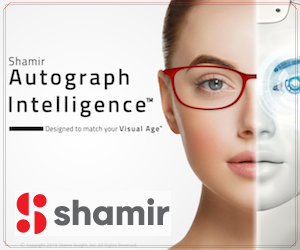
National Eye Care Month
January is recognized throughout the United States as National Eye Care Month. This is a great time to remind patients about the importance of good vision and the need for regular complete eye exams.
Tip: Wearers are provided “an optimal visual and ergonomic experience for mid-distance and near-viewing office environments.”
It’s also an opportunity to remind them of the overall health benefits of complete eye exams. Without your input, most people won’t understand that complete exams not only find vision and eye health issues early, but they can also disclose other problems that impact overall health, including high cholesterol and diabetes.
The issue? According to the American Optometric Association (AOA.org), “[nearly] all Americans believe their eye health is just as important as the health of their heart, but nearly half of those, ages 23–38, don’t think they need an eye exam if their vision is clear.”
IN INFANCY AND CHILDHOOD
Routine exams, as opposed to just vision screenings, are especially important for children.
Be sure you share with patients the recommendations of the AOA regarding scheduling a child’s first exam at the age of 6 months, followed by another complete exam at age 3 and an exam at the beginning of each school year.
Why is this so important? Because vision problems can impact everything from a child’s ability to concentrate to reading comprehension and more.
IN ADULTHOOD
Even for asymptomatic individuals, the AOA recommends semiannual exams for adults beginning at age 18 and annual exams starting at age 65.
This is especially important for nearsighted people in the workplace, as they will often experience persistent eyestrain and headaches. It’s also a matter of their safety.
IN THE WORKPLACE
According to Shamir, with its Shamir’s Workplace™ lenses, wearers are provided “an optimal visual and ergonomic experience for mid-distance and near-viewing office environments.”
How? By “offering a greater depth of field, up to 10 feet, this lens design allows
movement within the workspace and [provides] sharp vision, whether the required
focus is on the desk or a colleague across the room.”
Explain to patients that Shamir Workplace™ lenses are a great second pair, whether they’re an additional pair of progressive lenses or an upgrade from everyday reading glasses.
Have you tried these lenses yourself and or prescribed them for patients? If so, tell us about it and share in the conversation on Facebook here.
Comments are closed.






